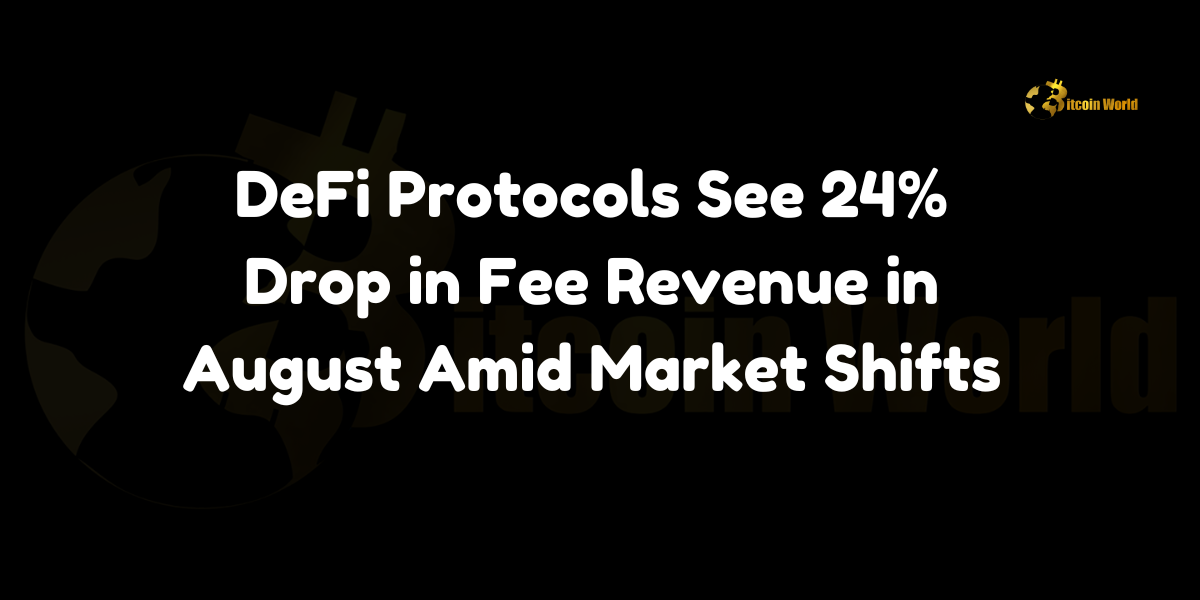DeFi protocols fee revenue August 2024 experienced a significant decline, with total fees charged by decentralized finance (DeFi) platforms dropping by 24.4% to $288.38 million, according to a report by The Block. This represents a substantial decrease from the $381.45 million recorded in July. The decline in fees is notable across the DeFi landscape, with key protocols like Lido, Uniswap, Jito, and PancakeSwap leading the sector, albeit with reduced revenues.
Key Contributors to the Decline in Fee Revenue
The drop in DeFi protocol fees in August has been attributed to several market dynamics, with independent market researcher Nick Ruck pointing to a few critical factors:
- Decrease in Annual Percentage Rate (APR) from Liquid Restaking Token (LRT) Strategies: The reduction in APRs from liquid restaking token strategies has directly impacted the profitability of staking, leading to lower transaction volumes and, consequently, reduced fee revenue for DeFi protocols. As these strategies become less lucrative, users are less incentivized to engage, resulting in a slowdown in activity across the board.
- Popularity of Meme Coins: The recent surge in the popularity of meme coins has also played a role in the decline of fee revenues. These coins, often characterized by their high volatility and speculative nature, tend to draw attention away from more established DeFi protocols. As traders flock to these high-risk, high-reward assets, the demand for traditional DeFi services diminishes, further contributing to the overall decline in fee revenue.
Top DeFi Protocols by Fee Revenue
Despite the overall decline, several DeFi protocols continued to generate substantial fees in August:
- Lido: Leading the pack, Lido charged $76.18 million in fees, maintaining its position as a dominant player in the DeFi ecosystem. Lido’s focus on liquid staking and its role in Ethereum’s transition to proof-of-stake have helped it remain resilient, even in a challenging market environment.
- Uniswap: As one of the most popular decentralized exchanges, Uniswap also saw significant fee revenue, though it too was affected by the broader market downturn. Uniswap’s fee structure, which depends heavily on trading volumes, naturally reflects shifts in market activity.
- Jito and PancakeSwap: These protocols also contributed notable fees, highlighting the continued, though diminished, activity within the DeFi sector. PancakeSwap, in particular, remains a key player in the Binance Smart Chain ecosystem, offering a range of DeFi services from swaps to yield farming.
Market Implications and Future Outlook
The DeFi protocols fee revenue August 2024 decline reflects broader market trends and highlights the sensitivity of DeFi revenues to shifts in user behavior and market sentiment. The decrease in APRs from liquid restaking strategies suggests that users are becoming more cautious and selective about where they allocate their assets. This caution, combined with the allure of speculative investments like meme coins, has temporarily diverted activity away from traditional DeFi protocols.
Looking ahead, the DeFi sector may need to adapt to these changing dynamics by exploring new strategies to attract users and maintain fee revenues. This could include offering more competitive APRs, diversifying services, or integrating with emerging trends like meme coins in a way that adds value rather than detracts from core DeFi services.
Moreover, as the market matures, there could be a consolidation among DeFi protocols, with those offering the most value and resilience in the face of market volatility likely to emerge as leaders. Protocols that can innovate and respond to user demands will be better positioned to sustain their revenue streams and potentially regain lost ground in future months.
Conclusion
The DeFi protocols fee revenue August 2024 downturn marks a notable shift in the decentralized finance landscape, with key protocols like Lido, Uniswap, Jito, and PancakeSwap experiencing a reduction in fees. The factors driving this decline, including lower APRs from liquid restaking strategies and the distraction of meme coins, highlight the challenges DeFi platforms face in maintaining growth and user engagement.
As the sector navigates these challenges, the ability of DeFi protocols to innovate and adapt will be crucial in determining their long-term success. The coming months will reveal whether this decline is a temporary setback or indicative of a broader trend that could reshape the DeFi market.
To learn more about the innovative startups shaping the future of the crypto industry, explore our article on latest news, where we delve into the most promising ventures and their potential to disrupt traditional industries.
Disclaimer: The information provided is not trading advice, Bitcoinworld.co.in holds no liability for any investments made based on the information provided on this page. We strongly recommend independent research and/or consultation with a qualified professional before making any investment decisions.




